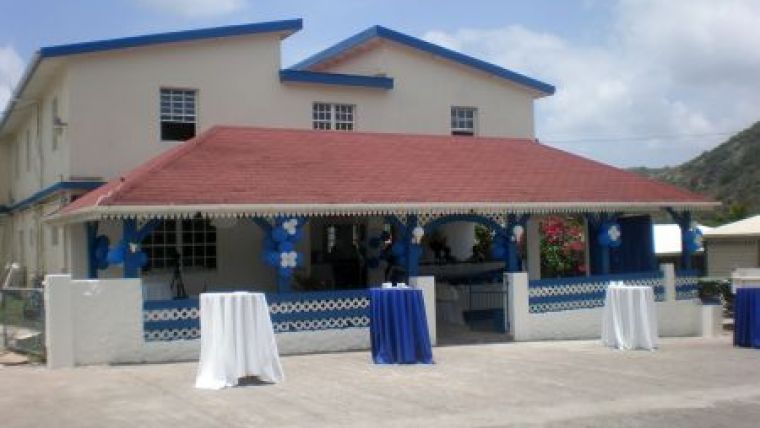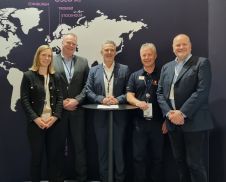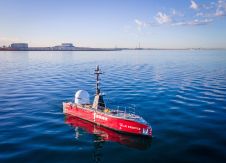Research on Varied Caribbean Geophysical Aspects
The Caribbean Netherlands Science Institute at St Eustatius
The Caribbean Netherlands Science Institute at St Eustatius (CNSI) is a research facility that supports basic, strategic, applied, societal and policy relevant research and education in all fields of science. This initiative has been made possible by the Netherlands Ministry of Education, Culture and Science (OCW), the island government of St Eustatius, the Netherlands Organisation for Scientific Research (NWO) and the NIOZ Royal Netherlands Institute for Sea research in close cooperation with the European and Caribbean Netherlands knowledge communities and stakeholders. CNSI welcomes and supports relevant activities of users (public and private) from around the globe. CNSI officially opened on 24 April 2014.
CNSI aims to facilitate scientific curiosity in which issues and questions relevant to the sustainability of tropical small island economies are addressed. It fosters the ambition to develop into an authoritative expert and facility centre acknowledged in the wider Caribbean region, positioned at the intersection of scientific research, education, management and governance.
Its mission is to realise a permanent scientific presence in the Caribbean Netherlands (the islands of Bonaire, Saba and St Eustatius) with research facilities, outreach facilities and accommodation for visitors. This mission is based on the vision that the Caribbean and the Netherlands share a mutual responsibility for the sustainable development of the Caribbean Netherlands islands and their marine territories. Working toward this goal requires an understanding of each other’s institutional organisations, historical and cultural backgrounds, management and development priorities and natural and societal resources. CNSI is therefore committed to multidisciplinary knowledge development and human and institutional capacity building by fostering (academic and vocational) education and training, and organising courses, workshops and meetings in cooperation with local organisations and international stakeholders. It is clear that the sustainability of these small island economies cannot be regarded in isolation and should be addressed within the context of the greater Caribbean region so as to encourage a sustainable socioeconomic impulse in the region.
Marine and Maritime Issues
The marine environment makes up the largest part of the Caribbean. It is potentially an important asset to the Caribbean communities, e.g. for fisheries, trafficking, deep sea mining, etc. Further exploration of the marine environment may reveal its use potential. There are a couple of research projects underway that will be supported by CNSI so as to disclose some of the unknowns of the Dutch Caribbean marine environment:
- Stability of Caribbean coastal Ecosystems uNder future Extreme Sea level changes (SCENES) (Utrecht University). For many Caribbean islands, the shallow bays and lagoons consist of calcic sediments that are maintained primarily by calcifying algae. To determine the effects of climate change on the coastal ecosystems in the Caribbean, a comprehensive multidisciplinary project has been formulated involving analysis of regional ocean observations and global high-resolution ocean modelling, high-resolution biogeomorphological modelling and field work on sediment dynamics, wave climate, temperature and pH dynamics. CNSI is the host of experiments on how key species respond to multiple interacting stresses in a multispecies situation and at a diversity of temporal scales.
- Caribbean coral reef ecosystems: interactions of anthropogenic ocean acidification and eutrophication with bioerosion by coral excavating sponges (Royal NIOZ).
- 4D crust-mantle modelling of the eastern Caribbean region: toward coupling deep driving processes to surface evolution (Utrecht University).
- Caribbean cruisers in the Kingdom: ecology and protection of sea turtles (Groningen University).
- Biodiversity Base-line Study (Naturalis Biodiversity Centre, Leiden).
Another plan is to study the potential of beach restoration and coral regrowth making use of an artificial reef structure at St Eustatius. Funding for information about Statia’s coastal bathymetry, its morfodynamics and a coastal dynamics model is required. This information could also be used for managing St Eustatius’ harbour, underwater archaeology, and the dive sector. ‘Blue Economy’ is also a development for which CNSI would like to team up with relevant partners.
CNSI has been made possible by NIOZ and has a Steering Group consisting of its main stakeholders: NIOZ, the Faculty of Archaeology of Leiden University, IMARES Wageningen UR, Naturalis Biodiversty Centre, the Royal Netherlands Institute of Southeast Asian and Caribbean Studies (KITLV), NWO and OCW. This was reflected during the opening, as Island Governor Gerald Berkel of St Eustatius opened CNSI on 24 April 2014 together with Jos Rokx of OCW and Edwin van Huis, director of Naturalis. Edwin van Huis then opened the biodiversity photo exposition entitled ‘The natural beauty of Sint Eustatius’ at CNSI.

Value staying current with hydrography?
Stay on the map with our expertly curated newsletters.
We provide educational insights, industry updates, and inspiring stories from the world of hydrography to help you learn, grow, and navigate your field with confidence. Don't miss out - subscribe today and ensure you're always informed, educated, and inspired by the latest in hydrographic technology and research.
Choose your newsletter(s)
























